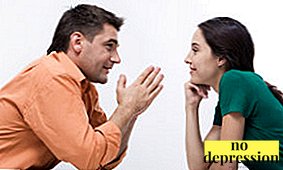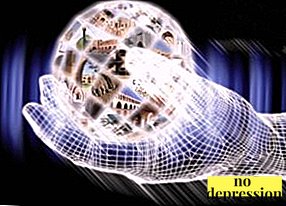Interacting with society, each person plays a large number of social roles.
Understanding, acceptance by man public "rules of the game" - an important way of self-identity, the choice of an effective strategy for existence.
But the incompatibility of different role installations can cause conflicts and even tragedy for a person.
Concept in psychology

Human community, society - complex combination of rules and relationships, the established system of values, traditions and attitudes.
In this system, per person, as a participant in the life of a community group, certain expectations are imposed: exactly how he should behave in one capacity or another, in order to correspond to the existing ideas of people about positive, correct, successful behavior.
In the first half of the 20th century, American scientists — anthropologist, sociologist Ralph Linton, and philosopher-psychologist George Herbert Meade — suggested the primary definition of a “social role” almost simultaneously, but independently of each other.
Linton presented the public role as a system of norms and rules set by man by society. Mead - as publicly or privately established social game, including in which, a person masters the laws of society and becomes his “cell”.
With all the difference in definitions, a general concept was subsequently formed from them, in which the social role is "Spike" of the individual and society, combination in the behavior of a person manifestations of purely individual and formed under the influence of society.
The social role is the expectation of society, that a person, as a carrier of some social status, will behave in a certain way.
Classification: list

Since the life and functionality of a person among themselves are varied, then the classifications of roles in society lots of.
Roles, determining the place of an individual in a complex hierarchy of human contacts:
- by gender - women, men;
- by professional affiliation;
- according to the age - child, adult, elderly person.
People’s relationships can also be described as social roles:
- husband, wife, mother, father (family);
- leader, leader, leader;
- social outcast, outcast, outsider;
- everyone's favorite, etc.
Personality in the social system is the "performer" of many public roles. They can be distributed officially, consciously, or arise spontaneously, depending on the development of a particular life situation.
For example, regulations adopted in the working organization, will dictate to its employees certain rules of the game.
Each household situation makes a person a participant in numerous “human games” already colored by the formed expectations of society.
Types and types

The first systematization of public roles belongs to one of the founders of modern sociology, an American Tolcott Parsons.
Any role of an individual in society, the sociologist argued, can be succinctly described with just five main characteristics:
- The possible depth of the interaction of people with each other. For example, the teacher and the student are contacted within the rules of the organization of the educational process. But communication of spouses or close friends is incomparably deeper, involves a much larger range of issues of interaction.
- The way in which the social role is obtained (acquired). There are roles that belong to a man due to factors beyond his control: he is a man or a woman, a child or an adult member of a social group. Opposed to such social control are those that people deliberately achieve through the application of effort.
So getting a particular profession, position at work requires action from the person.
- The scale of the possible manifestation of emotions in communicating people with each other. For example, the communication of colleagues, the interaction of the seller with the buyer does not imply a strong manifestation of feelings. But in the family, from a spouse, parent or child, mental involvement is expected, emotional involvement in each other's affairs.
- The presence or absence of certain rules of interaction. So the police officer at work is obliged to ensure that people comply with the law, and the attendant is obliged to accept for storage, and then deliver the things to the client of the institution. The rules are set by the duties that these people perform. A woman in the family can take the outerwear from her husband or child in order to hang it in the closet, although formally she is not obliged to do this.
- Motives that move a person in committing activities. So from the merchant society expects that he will act, in the expectation of making a profit. But from the ministers of religious or charitable organizations a similar motivation will be perceived as a violation of moral norms, as society will be expected to disinterested society for the benefit of society.

Absolutely any role of a person in society can be described in detail with the help of the listed characteristics.
Life examples
Community education norms, stereotypes (rules of the game) begins with a person's early childhood:
- From parents the child receives knowledge about what can and cannot be done in different life situations. How to behave in relation to the mother, father, elders in general, friends. What rules of conduct must be observed on the street, on a visit, in kindergarten, school.
- Since the early childhood is mastering gender roles. The expectations of how girls and boys should behave are different. The same behavior of heterosexual children will meet different reactions of parents. For example, the crying girl will be comforted, and the boy will be told that it is not fitting for a future man to cry.
- As they grow upThe child learns the social roles of a student at a school, a friend in a company of peers, a participant in circles and sections of interest. In the near future, a young person usually expects student status as an educational institution.
- With education a professional mission in society is being developed - a doctor, a salesman, an actor, a teacher.
- Men and women create families, mastering the roles of husband and wife, and then - parents.

People, knowing about the status in the society of this or that person, present a certain established, expected set of requirements to their behavior.
There are already long established societies standards successfully or, conversely, poorly implemented social behavior for a particular case.
Although, of course, a person has freedom in relation to his “social game”. As a result, each individual is free to play a social role (or completely reject it) in accordance with his own concepts and ideas about life, individual characteristics.
What are they connected with?

"Standard" role set associated with the main areas of human life in society.
In psychology, there are social and interpersonal types of roles.
Social associated with a certain set of rights and obligations expected from a person, which, in the understanding of society, imposes this status on him:
- social status;
- professional affiliation, type of activity;
- gender etc.
Interpersonal roles are individual and are made up of specific relationships in a couple, group, community of people (for example, the universal pet in the family).
Since each individual is a “carrier” of a large number of social roles associated with one status, the concept of a role set (complex) is highlighted in psychology.
Inside the complex is divided typical social roles of personality and those that arise depending on the situation.
To typical basic social roles include those that form the backbone of the individual’s personality:
- his interaction in the family, with his neighbor ("relatives") social circle;
- belonging to a professional society, circle;
- social and political activities and beliefs.

Unlike basic (permanent) social roles situational arise spontaneously and end with the change of the “plot”.
For example, in one day a person has time to be a passenger, driver, buyer, pedestrian.
Theory
George Meade, one of the founders of the role theory, first of all showed in his writings the process of realizing one’s own self as an individual, which occurs precisely in interaction with society.
Self-awareness is initially absent in the baby. By communicating within his social group (usually the family), the child tries on the “ready-made” roles offered to its members.
He faces daily ready-made models and learns how a mother and father behave in relation to each other, how they communicate with friends, neighbors, work colleagues, other family members, with him personally.
That is how he gets the first experience of social contacts. "Trying on yourself" offered him behavioral patterns, the child begins to recognize himself as a member of society (social subject).

This is the development of personality - in playing some roles.
Mead argued that "Role essence" - the main mechanism of personality, the backbone of its structure.
The actions of a person are associated primarily with the social attitudes he has learned, as well as the expectations of society and the individual himself of obtaining a specific result from the performance of a particular role in society.
How to define your own?
Determining your social roles is easy. It is enough to “inscribe” oneself into the existing system of one’s own relationships with society.
The social order of a person exists where he has duties (society's expectations) to behave in a certain way:
- From son (or daughter) to parents expected obedience (in childhood), help - from an adult child.
- Pedestrian status imposes obligations to follow the rules of movement on the streets (to observe traffic lights, move along the sidewalk, and not the roadway). Driver car must comply with the rules of the road law.
- The role of a student of a higher educational institution involves attending classes, passing exams and tests in a timely manner, the rules admissible behavior in lectures and within the walls of an educational institution.
- Friend status means the support of a friend, the protection and separation of his interests and value systems.
- Parent must take care of the child, provide his vital needs, monitor the state of health, educate, transfer knowledge about life, social norms, acceptable ways of interacting with people.

Often to perform different roles from a person constant change of behavior is required.
Expectations that a person will successfully fulfill several social roles, the requirements of which contradict each other, lead to a situation that has received the name of role conflict in psychology.
In an adult member of society set of dominant social roles (the way he performs them) is already formed. Their combination is a kind of public “file” of a person, his individual, but for others - a typical and familiar (expected, predicted) image.
Social roles of people:



